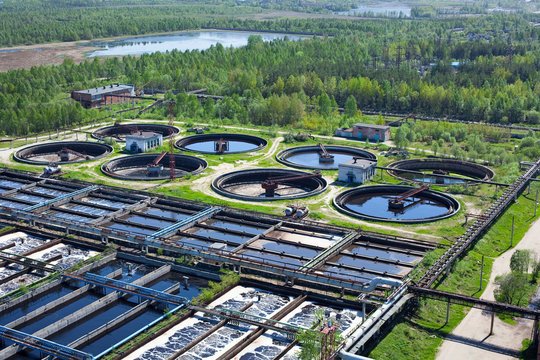
Effluent treatment plant, also known as ETP is a waste water treatment process (WWTP) that is used to treat waste water. It's mostly used in industries like pharmaceuticals, textiles, and chemicals where extreme water contamination is a possibility. Effluent Treatment Plant plays a significant role in the treatment of industrial waste water as well as domestic sewage. Organic matter, inorganic matter, heavy metals, oil & grease, suspended particles, and other contaminants are treated in the wastewater treatment process of an ETP plant.
Chemical treatment, biological treatment, a combination of chemical and biological treatment, and thermal treatment are the several types of wastewater treatment plants. Effluent is generated in many manufacturing industries like textile, pharmaceuticals and chemicals, tanneries etc. Contaminated water cannot be released without treatment as it contains toxic and non-toxic chemicals. Releasing it may cause contamination of the existing pure water and will affect the environment. As a result ETPs are installed in most manufacturing industries.
Effluent Treatment Plant or ETP is one type of waste water treatment method which is particularly designed to purify industrial waste water for its reuse and its aim is to release safe water to environment from the harmful effect caused by the effluent. Industrial effluents contain various materials, depending on the industry. Some effluents contain oils and grease, and some contain toxic materials (e.g., cyanide).

 One of the primary benefits of ETPs is their role in protecting the environment by treating industrial wastewater to remove harmful pollutants and contaminants.
One of the primary benefits of ETPs is their role in protecting the environment by treating industrial wastewater to remove harmful pollutants and contaminants. ETPs help industries comply with local, national, and international environmental regulations governing the discharge of wastewater.
ETPs help industries comply with local, national, and international environmental regulations governing the discharge of wastewater. ETPs promote resource conservation by reclaiming and recycling water, energy, and valuable materials from industrial wastewater.
ETPs promote resource conservation by reclaiming and recycling water, energy, and valuable materials from industrial wastewater. Effluent treatment plants contribute to public health and safety by reducing the risk of waterborne diseases and contamination of drinking water sources.
Effluent treatment plants contribute to public health and safety by reducing the risk of waterborne diseases and contamination of drinking water sources. Effluent treatment plants support sustainable development goals by promoting responsible water management practices and reducing the environmental impact of industrial activities.
Effluent treatment plants support sustainable development goals by promoting responsible water management practices and reducing the environmental impact of industrial activities.